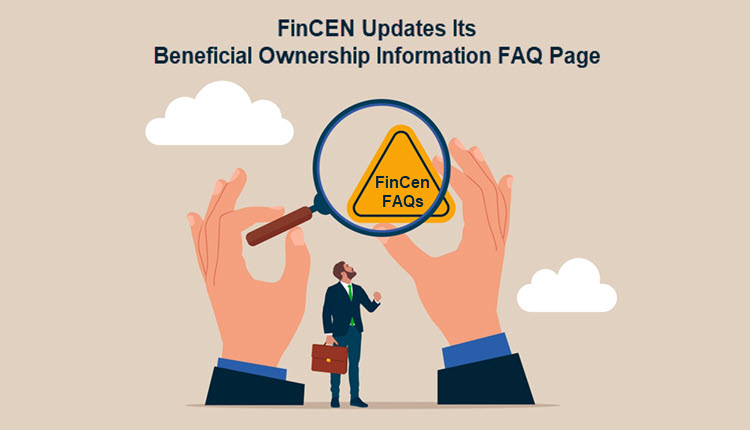FinCEN Updates its Beneficial Ownership Information FAQ Page
Elizabeth Q. Boehmcke Esq. On April 26, 2024
On April 18, 2024, FinCEN updated its Beneficial Ownership Information Frequently Asked Questions page to include new questions concerning beneficial ownership through trusts, application of the rules to corporate trustees, and other topics.
New Questions D.14-D.16 focus on beneficial ownership of reporting companies through trusts.
Question D.14 confirms that beneficial owners can own or control a reporting company through trusts either by exercising substantial control over a reporting company through a “trust arrangement” or by owning or controlling ownership interests of a reporting company that are held in a trust. This is not new, though practitioners should take note of the phrase “trust arrangement” as further indication of the broad scope of these regulations and FinCEN’s intent to include informal agreements and arrangements as well as formalized corporate and trust structures.
Question D.15 generally restates the regulations on who is considered a beneficial owner of a reporting company when an interest in the company is owned or controlled by a trust. In articulating a facts and circumstances test as to which beneficiaries, grantors, trustees, and other individuals may be beneficial owners, FinCEN makes an unintentionally humorous statement: “Trust arrangements vary.” Too true, FinCEN. Unfortunately, this FAQ does not provide any real clarity for analyzing a trust to determine beneficial owners beyond that already provided in the regulations. At present, practitioners should likely interpret the scope of these regulations quite broadly and err towards over-reporting of individuals who have any control over a trust that owns or controls a reporting company.
Question D.16, on the other hand, gives additional information about how a reporting company reports beneficial ownership when there is a corporate trustee, and should be reviewed carefully. Essentially, FinCEN is articulating a “look-through” rule in which the “reporting company should determine whether any of the corporate trustee’s individual beneficial owners indirectly own or control at least 25 percent of the ownership interests of the reporting company through their ownership interests in the corporate trustee.” FinCEN provides some simple examples for how to determine if an individual owner of the corporate trustee has sufficient interest in the corporate trustee combined with the trust’s ownership or control of the reporting company to cause the individual to be a beneficial owner of the reporting company. Assuming the combined ownership interests are sufficiently high, the individual owner of the corporate trustee is deemed to be a beneficial owner of the reporting company and the individual’s information must be reported.
However, there is an exception if (i) the corporate trustee is an entity that is exempt from the beneficial ownership reporting requirements, (ii) an individual beneficial owner of a reporting company is such only by virtue of ownership interests in the corporate trustee, and (iii) the individual beneficial owner does not exercise substantial control over the reporting company. In the event that all three conditions are met with respect to a particular individual beneficial owner, then the reporting company can report the name of the corporate trustee in lieu of information about the individual beneficial owner. This analysis would need to be undertaken with respect to each individual who has an ownership interest in the corporate trustee.
But note that this exception only applies to those who are individual beneficial owners only by reason of ownership interests in the corporate trustee and who have no substantial control over the reporting company (and then only if the corporate trustee is itself an entity exempt from the reporting company rules). If an individual beneficial owner happens to also own interests in the reporting company in addition to their ownership interest in the corporate trustee, the exception may not apply because beneficial ownership is determined by aggregating ownership interests. Moreover, to the extent owners of the corporate trustee or “individuals employed or engaged by the corporate trustee” exercise substantial control over the reporting company, their information seemingly must still be reported. In cases where at least a majority of the reporting company is owned by a trust with a corporate trustee, it is likely that the broad definition of “substantial control” will ultimately identify individual trust officers and other corporate decision makers as beneficial owners who are not entitled to report the name of the corporate trustee, meaning their individual information must be reported.
You can read all of the Beneficial Ownership Information FAQs here.
InterActive Legal’s Attorney Resource Center for
the Corporate Transparency Act (CTA)

The Corporate Transparency Act will require almost every small corporation, limited liability company, and limited partnership to report certain information about its “beneficial owners” to the Financial Crimes Enforcement Network or “FinCEN.” The rules for entities created after January 1, 2024 require reporting within 30 days of formation, while entities existing as of January 1, 2024 have until January 1, 2025 to report. Identification of “beneficial owners” may be a complicated process because individuals can be deemed to be beneficial owners through direct or indirect ownership or control of an entity. In addition, changes in beneficial ownership will also require almost immediate reporting. Failure to report may result in substantial civil and criminal penalties. Are you prepared to assist and educate your clients in connection with the CTA?
InterActive Legal is here to help and is proud to announce the creation of the “Corporate Transparency Act Attorney Resource Center.” This new page of our website will be dedicated to education on the Corporate Transparency Act and will also contain additional resources for InterActive Legal’s subscribers. We are pleased to offer the webinar “Are you prepared for the Corporate Transparency Act?” by Jonathan G. Blattmachr, Esq., Abigail E. O’Connor, Esq., and Martin M. Shenkman, Esq (originally aired November 20, 2023), and an article from Forbes by Martin M. Shenkman published on November 14, 2023 “Act Before Year End: Corporate Transparency Act Is Coming!” In addition, you can find links to the text of the Corporate Transparency Act, 31 U.S.C. 5336 (Beneficial ownership reporting requirements), Beneficial Ownership Information Reporting Requirements Final Rule, Use of FinCEN Identifiers for Reporting Beneficial Ownership Information of Entities Final Rule, Small Entity Compliance Guide from FinCEN, and Frequently Asked Questions from FinCEN. Finally, subscribers will find a Sample 2023 Year End Letter to send to clients that discusses both the Corporate Transparency Act and the imminent sunset of the increased estate and gift tax exemption and what steps clients need to take. There are many unanswered questions about the Corporate Transparency Act, especially its application to trusts, and we anticipate that we will be adding more resources and educational information over time.
Author


